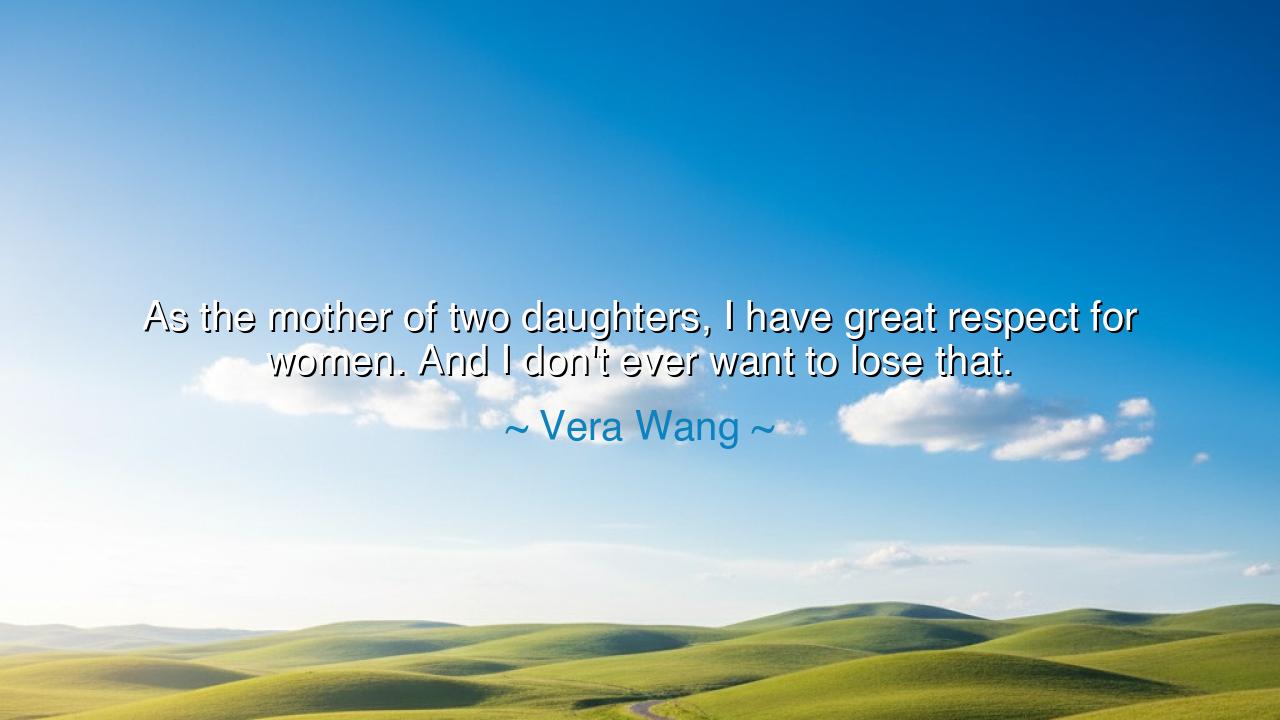
As the mother of two daughters, I have great respect for women.
As the mother of two daughters, I have great respect for women. And I don't ever want to lose that.






“As the mother of two daughters, I have great respect for women. And I don’t ever want to lose that.” Thus spoke Vera Wang, the visionary of elegance and endurance, whose hands have clothed both brides and dreams. Yet in this gentle and unassuming statement lies a truth far greater than fashion — a truth about womanhood, legacy, and the sacred duty of respect. Her words are not mere sentiment; they are a vow. For in the heart of every mother, the destiny of the future is written, and in her reverence for her daughters, she affirms reverence for all women — for every generation that will rise after her.
To respect women, in Wang’s sense, is not to flatter or idealize them, but to honor their resilience, their depth, and their boundless capacity to create, not only life but meaning. It is to recognize that every woman, whether mother, daughter, or sister, carries within her the same flame that has guided humanity through ages of hardship and triumph. Vera Wang, herself a symbol of determination, rose in a world of art and commerce where women once stood as exceptions rather than equals. In her journey, she learned that success without humility and respect for others is hollow, but success that uplifts — that remembers the grace and strength of women — endures beyond the self.
In her daughters, Wang sees both reflection and renewal — the continuation of a lineage of courage. The mother who looks upon her children does not see herself alone, but the entire chain of women who came before and those who will come after. To say she “does not want to lose that respect” is to confess a sacred fear: that the world, in its haste and vanity, may forget the worth of women’s quiet strength. Thus, her words are not only maternal but moral — a call to remember that reverence for women is reverence for life itself.
Consider the story of Marie Curie, who, like Wang, was both mother and master of her craft. She worked by candlelight in a laboratory of dust and danger, discovering the forces that would change science forever. Yet she never ceased to be a mother, guiding her daughters through a world that too often failed to recognize their worth. Her daughter, Irène Joliot-Curie, would follow in her footsteps, becoming a Nobel laureate herself. Here, too, we see the same truth — that greatness is not inherited, but taught, and that respect, passed from mother to daughter, becomes the seed from which empires of wisdom grow.
Wang’s quote also reminds us of the delicate balance between power and grace. To “never lose respect” is to guard the soul against pride and forgetfulness. In a world that prizes achievement, it is easy to measure worth by acclaim. But the wise know that the highest success is not the one that lifts oneself above others, but the one that raises others beside you. Respect for women, for all people, is not a passing courtesy — it is the foundation of civilization. Without it, progress becomes empty, and knowledge becomes cold.
Her words echo the timeless wisdom of the ancients — for even the philosophers of Greece, though often blind to the equality of women, taught that honor was the root of virtue. In this light, Wang’s statement becomes a modern commandment: to honor womanhood not as an idea, but as a living reality, to remember that every success stands upon the unseen labors of mothers, daughters, and sisters who came before. To lose respect for women is to lose touch with the very source of humanity’s endurance — compassion, creativity, and courage.
So, my children, let this lesson be carved upon your hearts: to respect women is to respect life. Whether you are a parent or child, a leader or laborer, never forget the quiet power that shapes the world from within. Speak with gratitude to the women who have shaped you; listen to their wisdom; honor their work, seen and unseen. Build a world where daughters may rise without fear and mothers may rest knowing their struggles bore fruit. For the measure of a society is not its wealth or power, but how it cherishes those who give it birth and meaning.
And thus, when Vera Wang says she “does not ever want to lose that respect,” she speaks not only for herself but for all who understand the sacred bond between love and reverence. For when the world forgets to respect women, it forgets to respect its own soul. But when we remember — when we honor womanhood in all its forms — we awaken again to the divine balance of creation: strength and tenderness, ambition and grace, intellect and compassion. This is the wisdom of the ages, whispered through the voices of mothers to their daughters since time began — never forget the worth of women, for through them, all greatness is born.






AAdministratorAdministrator
Welcome, honored guests. Please leave a comment, we will respond soon